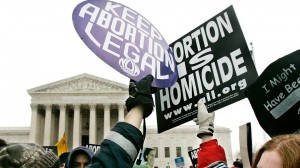Holy Week, Choice and the Problem of Evil and Sin
 We are in Holy Week 2015, so it is most appropriate to consider the problem of evil and sin. The sacrificial Passion, death and Resurrection of Jesus Christ was to settle with God the problem of human sin and evil.
We are in Holy Week 2015, so it is most appropriate to consider the problem of evil and sin. The sacrificial Passion, death and Resurrection of Jesus Christ was to settle with God the problem of human sin and evil.
I have often heard the question, “If there is a God, why does he permit evil?” At a different moment the same person will extol and demand personal choice. (The Freedom to choose is the mantra of our age.)
The problem is this: The moment there is a possibility of choice there is a risk of making the wrong choice. A perfect God of love wants to love and be loved perfectly. Real love involves our choice to love God back — or we can reject Him. God took that risk.
I suppose He could have created a world where the objects of his love had no choice but to love him, like robots. But that is not love.
C.S. Lewis put it this way in his classic Christian book Mere Christianity:
“God created things which had free will. That means creatures which can go wrong or right. Some people think they can imagine a creature which was free but had no possibility of going wrong, but I can’t. If a thing is free to be good it’s also free to be bad. And free will is what made evil possible. Why, then, did God give them free will? Because free will, though it makes evil possible, is also the only thing that makes possible any love or goodness or joy worth having. A world of automata — of creatures that worked like machines — would hardly be worth creating. The happiness which God designs for his higher creatures is the happiness of being freely, voluntarily united to Him and to each other in an ecstasy of love and delight compared with which the most rapturous love between a man and a woman on this earth is mere milk and water. And for that we have to be free.”
My generation (the baby-boomers) have illustrated the risk of choosing as much (or more) than previous generations. My generation took a freedom to choose and twisted it into barbarity of the license of choice where the weakest and most vulnerable must pay for the choices of those with power over them. Large swaths of my generation threw off restraint and have scoffed at the Giver of freedom.
This has resulted in the deaths of millions upon tens of millions of children before they ever saw the light of day or took their first breath.
Now freedom to choose will soon expand to killing suicidal people with disabilities, incurable conditions or “psychological pain”, in my nation (Canada). Choosing to reject God is wreaking havoc on the social and legal fabric of America, too and other parts of western civilization. We chose evil rather than good.
Just as people go to Auschwitz and wonder how such evil is possible, future generations may look at the remnants of our abortion clinics and wonder the same thing.
Our choices will either save us or condemn us.
The good news is that we can change what we have chosen and choose God rather than ourselves. The beautiful paradox is that when we give God our broken selves, He gives us back ourselves healed and more complete, able to finally love and be loved more fully than we ever imagined possible, if we allow Him to.
And that brings us back to the point of Holy Week, which we are observing now. Christ’s Passion and death on the cross was the ultimate expression of perfect love to pay the penalty for our sins and choosing evil over good. It is a free gift for all you accept it and believe in his atoning sacrifice at the cross.
Repentance is liberating! It frees us from choosing what was wrong and evil to choosing what is right and holy. Repentance and faith in Christ opens new horizons for an ecstasy of experiencing His perfect love and inklings of paradisial joy that awaits God’s children.[1]

